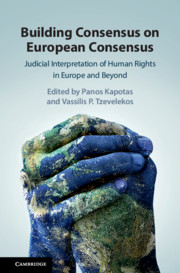 Building Consensus on European Consensus
Building Consensus on European Consensus Book contents
- Building Consensus on European Consensus
- Building Consensus on European Consensus
- Copyright page
- Contents
- Contributors
- Foreword
- Acknowledgements
- 1 How (Difficult Is It) to Build Consensus on (European) Consensus?
- Part I Understanding European Consensus
- 2 European Consensus
- 3 Consensus in the Legitimacy-Building Era of the European Court of Human Rights
- 4 Consensus, Stasis, Evolution
- 5 The Consensus Argument in NGOs’ Amicus Curiae Briefs
- 6 Determining the Content of the European Consensus Concept
- 7 How the ECtHR’s Use of European Consensus Considerations Allows Legitimacy Concerns to Delimit Its Mandate
- 8 Borges’ Pierre Menard, Author of the Quixote and the Idea of a European Consensus
- Part II Appraising European Consensus
- Part III Consensus Analysis Outside the ECHR System
- Index
5 - The Consensus Argument in NGOs’ Amicus Curiae Briefs
Defending Minorities through a Creatively Used Majoritarian Argument
from Part I - Understanding European Consensus
Published online by Cambridge University Press: 04 January 2019
- Building Consensus on European Consensus
- Building Consensus on European Consensus
- Copyright page
- Contents
- Contributors
- Foreword
- Acknowledgements
- 1 How (Difficult Is It) to Build Consensus on (European) Consensus?
- Part I Understanding European Consensus
- 2 European Consensus
- 3 Consensus in the Legitimacy-Building Era of the European Court of Human Rights
- 4 Consensus, Stasis, Evolution
- 5 The Consensus Argument in NGOs’ Amicus Curiae Briefs
- 6 Determining the Content of the European Consensus Concept
- 7 How the ECtHR’s Use of European Consensus Considerations Allows Legitimacy Concerns to Delimit Its Mandate
- 8 Borges’ Pierre Menard, Author of the Quixote and the Idea of a European Consensus
- Part II Appraising European Consensus
- Part III Consensus Analysis Outside the ECHR System
- Index
Summary
- Type
- Chapter
- Information
- Building Consensus on European ConsensusJudicial Interpretation of Human Rights in Europe and Beyond, pp. 96 - 119Publisher: Cambridge University PressPrint publication year: 2019


